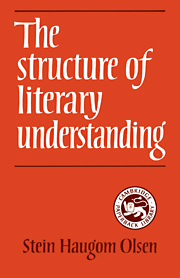Book contents
6 - EVALUATION OF LITERARY WORKS
Published online by Cambridge University Press: 30 September 2009
Summary
Interpretation and evaluation
It is possible to distinguish two problems in connection with the question of artistic merit in literary theory. The first concerns the basis on which a reader judges a single literary work. It consists in defining and elucidating a range of terms which he may use to state the reasons for assigning aesthetic merit to a work. Or, if this type of value-judgement is assumed to be expressed in the formula ‘w is good because it possesses the properties p1 to pn’,the problem is to explain the nature of the properties p1 to pn These properties constitute the good-making features of a work.
The second problem is to decide whether or not the properties p1 to pn are desirable on grounds to be sought outside the literary work, and if they are desirable for some such external reasons, to decide what these reasons are. Granted that these properties are acceptable as good-making features of a literary work because they contribute to its proper function, do they also have some further value which justifies the high place literary activities seemingly have in the value-scheme of our culture?
The problems may be distinguished briefly by labelling the first ‘the problem of the intrinsic value of the literary work’ and the second ‘the problem of the extrinsic value of literature’.
As a part of the interpretative model developed in the last two chapters, a critical vocabulary was used which was divided into two parts, descriptive and interpretative. However, in addition to these two types of terms, a fully developed critical vocabulary must also contain a set of evaluative terms.
- Type
- Chapter
- Information
- The Structure of Literary Understanding , pp. 160 - 198Publisher: Cambridge University PressPrint publication year: 1978



